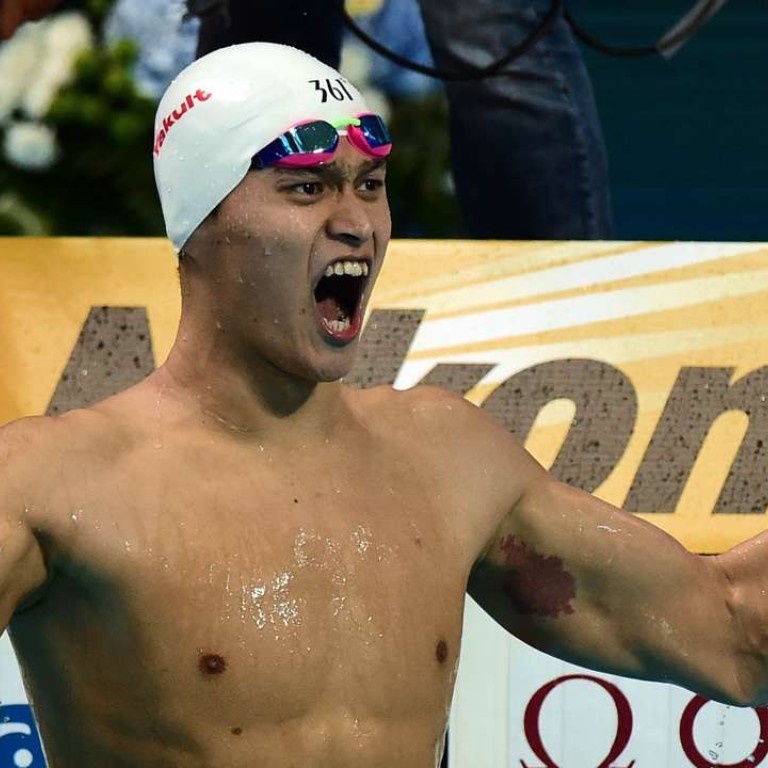
Sex, drugs and records roll: what lies ahead in Rio for China’s all-conquering swimmers led by their Sun-sation?
If China’s swimming team has a reputation for controversies, talisman Sun is no exception, and the man who knows no equal over 1500m has often made headlines for his activities outside the pool
Sun Yang’s career has mixed tales of sex and drugs with jaw-dropping world records, but China’s wild-child star will hope to stay clear of trouble as he anchors his country’s Rio Olympics swimming assault.
If China’s swimming team has a reputation for controversies, Sun is no exception, and the man who knows no equal over 1500m has often made headlines for his activities outside the pool.
Chief among his indiscretions was a three-month doping suspension in 2014 – served in secret and announced retrospectively – for taking a banned stimulant, which he said he needed for a heart complaint.

Along the way, Sun lashed the national anthem of China’s bitter war-time rivals Japan as “ugly”, and turned heads by pulling out of the 2015 world championships 1500m final, again citing a heart problem.
But no one would argue with the athletic achievements of the 1.98m Sun, 24, who is acclaimed as China’s most successful swimmer.
Sun became China’s first male Olympic swimming champion when he won the 400m and 1500m freestyle at London 2012, where he also lowered his own world record over the longer distance – after smashing Grant Hackett’s decade-old mark at the 2011 world championships in Shanghai.

More glory could follow in Rio, although with China’s swimmers taking part in few international events, their form is hard to assess.
In London, China unleashed Ye Shiwen, then only 16, who won a sensational women’s individual medley double including a new world record in the 400m race.
Ye attracted doping innuendo – strongly rejected by China – after her final 50m burst in the 400m medley was quicker than American Ryan Lochte’s when he won the men’s gold a few races earlier.

In March, China’s state media had reported that six Chinese athletes had failed doping tests – including two who were let off with warnings for taking the banned muscle-builder clenbuterol.
Liu Peng, head of the general administration of sport, said in May that Wada’s suspension of the Beijing lab has brought “difficulties and challenges” for China’s anti-doping work, according to a Chinese media report.
Chinese swimming has a chequered reputation following a rash of doping cases in the 1990s. Seven Chinese swimmers tested positive for steroids at the 1994 Asian Games in Hiroshima.

The towering Sun will be the most recognisable figure in China’s team, but his current form is largely an unknown quantity after he missed the national championships in April with a foot injury.
In June at Santa Clara, he won the 200m freestyle in a world-leading time, but then pulled out of the 400m final and the 1500m event without explanation.
It echoed last year’s world championships in Kazan, Russia, where Sun won the 400m and 800m but withdrew from the 1500m, blaming a heart condition.

Sun will hope for less choppy waters in Rio – although he may face a challenge from Italy’s Gregorio Paltrinieri, who swam the second-fastest 1500m in history at the European championships in May.
As for Ye, after her phenomenal 2012 Olympics, she failed to make the podium at either the 2013 or 2015 world championships, and was 22 seconds off her 400m medley world record at the Chinese championships, after suffering stomach pain.
However, Ning Zetao, who served a one-year suspension after testing positive for clenbuterol in 2011, should shine for China after he upstaged a strong field to win 100m freestyle gold at last year’s world championships.

.png?itok=arIb17P0)